
|
WHY PIRACY IS GOOD
A tangled (and lengthy) tale of morality.
It's weird how the simplest games can have
the longest stories. Today we're going to talk (well, I'm going to,
anyway) about a couple of games (well, four games, but we'll get to that)
that are about as Zen-basic as it's possible for electronic entertainment
to be. A pair of games which could be played by the one-armed dishwasher
from Robin's Nest (one for the mums and dads, there), a duo that require
all the brainpower of a starving dog pondering the best course of action
to take with a pound of sausages that's just fallen out of an old lady's
shopping bag right under his nose.
And yet, by the time we're done, we'll have
covered inspiration, plagiarism, moral flexibility, flagrant copyright
infringement, public-spiritedness, cultural history, corporate pragmatism,
collective short-sightedness and the proudest moment in your
correspondent's career to date. Which is a lot of stuff, so let's get on
or we'll be here all day.
Wild West Hero is one of the most esoteric
games in the history of the Spectrum. It takes Robotron - not the world's
most complex videogame to start with - and distils it down to its most
basic essence. All the enemies except the first level's GRUNTs are
discarded. The cloned human family to be rescued? Gone. The twin-joystick
moving/firing mechanism? No more. There's no fire button in WWH at all, in
fact - your little guy just automatically pumps out a constant stream of
fire in whichever direction he's facing.
No level in Wild West Hero lasts more than
about 10 seconds. Your enemies materialise onscreen and immediately start
shuffling slowly but inexorably towards you. Within moments, they'll
either have got you or you'll have killed them all. No other outcomes are
possible (unless you count killing yourself by colliding with one of the
static obstacles as you bolt for one of the screen's edges, there to
implement the game's core tactic of turning round and massacring the
bandits as they march towards you in single file).
Bandits? Oh yeah. While your avatar is the
same teeny robot dude who appears in Robotron, and the game shares the
coin-op's bright, flashing neon colours and futuristic sound effects, for
some reason your enemies are all big-hatted spaghetti-western cowboys,
with beady yellow eyes peeking out from under their ten-gallon hats. This
inexplicable thematic clash is one of the things that gives WWH its unique
and strange character, but that isn't one of the things on our list, so
we'll move on.
The point is, Wild West Hero owes a clear
and undeniable debt to Robotron, but it's also its own game. Which makes
it pretty weird when you see it gradually metamorphose back into its own
parent.
In the early 1980s, Atarisoft (the home
computer software division of the then-still-massive hardware company) had
invested a lot of effort and money in cracking down on unlicenced
home-version clones of their arcade smash hits.
Eventually, though, some bright spark realised that spending loads of cash
suppressing highly-skilled copies of your intellectual property was
pointlessly counter-productive, when you could turn it to your advantage
instead. Here, after all, were ready-made conversions, ripe for selling
and free from development costs. All Atari had to do was say to the
author, "Turn it over to us and we won't sue you", stick an official badge
on it and sit back and wait for the profits to start rolling in.
Among the first beneficiaries/victims of this
strategy was DJL Software's Z-Man, a direct Pac-Man clone that was by far
the most authentic of the dozens of Spectrum versions cluttering game-shop
shelves. It's one of the great legends of the Speccy gaming era that the
author, David J. Looker, was then approached by Atarisoft with the offer he
couldn't refuse - "Edit this into the official Spectrum version of
Pac-Man and give us it for nothing, or our lawyers will crush you like a tiny
worthless bug" - and a few tweaks later the company proudly made its
debut in the Speccy market with a hastily-relabelled, essentially
blackmailed version of what had
previously been a pirate ripoff of its most valuable licensed franchise.
(Though as an exciting postscript to the
story, the "illegal" Z-Man incarnation of Pac-Man was subsequently given
away on the
covertape of
Speccy magazine Your Sinclair almost 10
years later. An extensive and painstaking investigation into this baffling
turn of events - that is to say, emailing the renowned scientist,
adventurer and gadabout, and more relevantly former YS editor,
J Nash - provided the
following splendid explanation:
"This was because I liked Z-Man, and knew
about Atari and the Nigel Moustache accident, and thought it would be an
appropriate victory for justice and a funny in-joke to buy the world's
most accurate Speccy Pac-Man for the [covertape] under its original name.
Dave, slightly bemused anyone remembered the game, agreed. Inexplicably,
Atarisoft failed to notice. I expect they were still busy spending all the
profits from the conversion of Bump and Jump."
For more information on "the Nigel Moustache
accident", see a forthcoming feature, possibly on an entirely different
website. But meanwhile, back to our story.)
After Z-Man, DJ Looker (Shout out to the massive! -
Ed) moved into "respectable"
development. He coded the excellent Spectrum version of fun Atari coin-op
Road Blasters (which is, coincidentally, the game without which your
correspondent wouldn't be in the videogames industry at all, but that's
another story), then went on to fame and fortune as Your Sinclair's covertape editor, and also, ironically enough, co-invented the highly
controversial "Speedlock" fastloader/anti-copying protocol. But this poacher-turned-gamekeeper tale
isn't why piracy is good (which, particularly alert viewers who are
concentrating unusually hard will recall,
is what this feature is supposedly about). To get to the bottom of that
particular assertion, we first need to take a small tangent.
The success of Pac-Man assured Atarisoft of
the wisdom of their cunning co-opt-the-copyists policy, and the strategy
was soon applied to the forbidding task of bringing Williams' awesome
twin-joystick coin-op Robotron 2084 to the
Sinclair machine. Most of the previous
attempts at reproducing the arcade's fast-moving, action-packed mayhem
on the Speccy's primitive 8-bit hardware had produced woeful results, so
Wild West Hero author Paul Holmes was always going to be the man getting a
midnight knock on the door from burly Atarisoft associates armed with
contracts and baseball bats.
(Holmes hadn't been idle since coming up
with WWH - in the meantime he'd also produced the heroically weird
Dustman, a slicker and even more surreal variant on the theme than
Wild West Hero, and one in which the player has to survive assaults from
all manner of cultural detritus. Levels include several cameo appearances
from Pac-Man, a stage called "A Copyright With Teeth" - in which the dustman
is attacked by chomping copyright symbols - and one titled "Out Come The
Heavies", where swinging doors disgorge hordes of huge green robots
uncannily similar to Robotron's indestructible Hulks. These facts may or
may not be coincidental. Dustman, in fact, deserves a feature all of its
own, but WoS can see readers beginning to visibly age already, so we'll
save that for another day.)
The result, as perceptive viewers will have
figured out some time ago, is that Wild West Hero's code became the basis
of the official Speccy Robotron. But that's neither the end nor the point
of our story. Because despite being completed (well, it was glowingly
reviewed by a games magazine, though of course
these days we realise that that doesn't
necessarily mean it was finished - it's surely just a coincidence,
however, that the reviewer from the mag above went on a few months later
to co-found Future Publishing),
Robotron was never
released.
Atarisoft never even got round to
advertising it for the Speccy (something which they did do for a
whole bunch of other games whose conversions were never even started, far
less finished), and the code languished ignored for years, even as the
Speccy carried on for nine more years as a viable gaming platform. (The
company, in fact, abandoned the Spectrum shortly after the completion of
Robotron in 1984, also taking with it a fairly splendid unreleased port of
another fine Williams coin-op, Moon Patrol.) Oddly, no other magazines had
so much as previewed the game, so copies of the finished code were thin on
the ground - so much so that soon, even Holmes himself didn't have one. It
would be almost a decade before anyone ever
thought of Spectrum Robotron again.
The mid-1990s, of course, brought the birth
of emulation. For the first time ever, computers were so powerful that
they could accurately reproduce the behaviour of their ancestors, and the
still-beloved Speccy was one of the very first subjects of the phenomenon.
Soon, archive websites like
World Of Spectrum began to spring up to preserve the cultural
heritage of the medium. But for some games, it was already too late.
Atarisoft no longer existed, neither did Personal Computer Games, and Paul
Holmes didn't have a copy of his own conversion.
The only known surviving Spectrum Robotron
code was an early work-in-progress alpha of Holmes', missing most of the
enemy robot types (for example, there were no Brains on Wave 5, and the
Spectrum's Wave 7 - where the first Tanks appear in the arcade game -
simply completes itself as soon as it starts), and clearly showing the
port's Wild West Hero roots. The player and the enemy robots appear
onscreen in the same way they do in WWH, and destroyed robots melt away
rather than exploding in a shower of particles. At this point, in fact,
apart from the title screen the game more closely resembles Wild West Hero
1.5 than it does Robotron. Which is (if you were wondering) where piracy,
your reporter and his proudest moment come in.
Your correspondent, viewers, has to make a
confession at this point. In the early 1980s, this writer - like pretty
much everyone else, it ought to be said - was a serious and diligent
software pirate. The school playgrounds of the 80s were alive with kids
swapping C90 cassette tapes packed full of the latest games, 20 and 30 at
a time. (Curiously, this hugely widespread buy-one-and-copy-100 practice
somehow entirely failed to destroy the entire
games industry, and the Speccy had a longer commercial life than any
gaming platform before or since.)
The more dedicated copyright infringers,
though, also participated in nationwide piracy networks, trading tapes
with complete strangers from across the country. Your correspondent,
naturally (because if a job's worth doing it's worth doing properly), had
a number of such underground acquaintances, one of whom was "James" from
Glasgow. (Whose name has been changed to reflect the fact that I can't
remember it. For all I know it actually was James.)
"James" had a contact in Atarisoft,
and towards the end of 1984 had casually included copies of Robotron and
Moon Patrol on one of the regular C90s despatched to your
living-on-the-edge reporter. They both swiftly graduated onto your host's
special "My Favourite Games" shelf, but it wasn't until nearly 12 years
later that their true rarity and worth would be fully appreciated.
Y'see, chums, this writer
frequently
speaks
up for the importance of emulation - and even outright piracy - as a
preserver of culture, and he's not just bumping his gums. No other leisure
medium has ever regarded its heritage so carelessly as videogaming (not
even the early BBC, which would commonly record over the only copy of
priceless programmes to save on tape costs), and there are countless games
which have been lost to posterity forever. Without piracy, the Spectrum
ports of Robotron and Moon Patrol would be among them.
Because it was only piracy that enabled your
reporter to contact Paul Holmes several years ago and return his own work
to him (at which point he generously allowed it to be made freely available to
everyone), and even if this writer never achieves anything more worthy
than that in the rest of what passes loosely for a career, he'll leave the
games business a happy man. (Actually, the act of leaving the videogames
business would make anyone a happy man, but that's not strictly
relevant here.) Had it been left in the sole care of the games industry,
Spectrum Robotron simply wouldn't exist any more, and our cultural history
deserves better treatment, and more respect, than that.
The bodies which present themselves as the
guardians of gaming culture aren't just incompetent at the task, they are
in fact
the active enemies of it. Where ELSPA and their ilk should be doing
something worthwhile to preserve gaming's heritage while there's still
time, they devote themselves instead to pointlessly persecuting the very
websites that are actually doing their job for them. (And to chasing
idiotically after small-fry market traders, like an elephant trying to
stamp on a colony of ants.)
The industry attempts, as a matter of
policy, to portray
emulation - not even
piracy - as a mortal danger to its very existence, and is assisted in
doing so by a media that unquestioningly presents the industry's side of
the argument as gospel truth, and an increasingly brainwashed public ready
to believe the industry's farcical
propaganda about
how Al-Qaeda and the IRA and Ian Huntley and the Mafia all started out by
copying Playstation games.
But let's be crystal-clear about this,
viewers, for the avoidance of doubt and confusion. Take it from someone
who's personally been on every single side of the equation at some point
in the last 20 years. Here's the truth:
Emulation does
NOT hurt the videogames industry.
Piracy
does
NOT hurt the videogames industry.
Because if either of them did, then it's
amazingly obvious that - after more than 10 years of the former and 25
years of the latter - the videogames industry would have been long dead by
now, rather being bigger and wealthier now
than it's ever been at any time. The reality is that piracy and emulation
are in truth phenomena whose primary influence on gaming is to save its
legacy from the greedy, narrow-minded, short-sighted recklessness of those
who control the worldwide videogames industry.
Chums, the fact of the matter is that the
cultural heritage of videogaming is safe only in your hands. Recent changes in
the law with regard to copyright
have made the position of old games even more perilous than it used to be.
Now, practically any measures which gamers could take to preserve the
future history of gaming are, either effectively or literally, illegal,
and accordingly are becoming harder and harder to actually enact.
Something needs to be done. And shortly, something will be. Watch this
space.
In the meantime, it's in that same spirit of
preservation that WoS is proud to
offer the downloads below as an illustrative, iNTeRacTIVe accompaniment to
this feature. (Get the emu from its homepage, right-click on the game
files to save them to your hard drive.)
Enjoy them while you still can.
DOWNLOADS
EmuZWin, the best
freeware Speccy emulator (link)
Wild West Hero
Wild West Hero (great PC remake - WoS remix)
Dustman
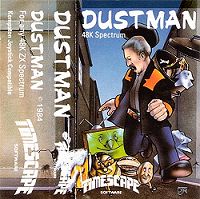
Robotron 2084 - author's alpha version
Robotron 2084 - beta version, preserved by
piracy
Robotron
2084 - final version, preserved by piracy
Comments? WoS Forum
|
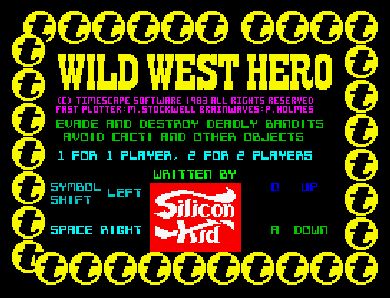
In a fine example of its stripped-down Spartan ethic,
Wild West Hero's title screen also served as its loading screen and
instruction manual.
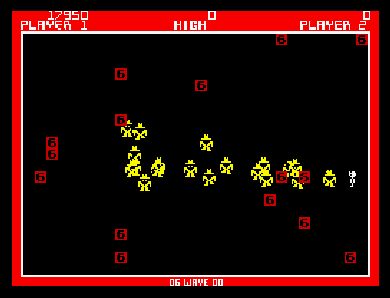
The key - some might say only - gameplay tactic in WWH was to get to
the edge of the screen then turn back on your pursuers, guns
blazing.

The title screen for the official version didn't take
a lot of extra work. Change a "t" (for "Timescape") to a "W" and
you're practically there.
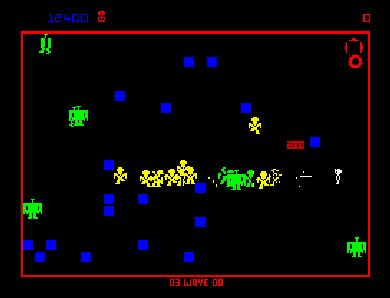
Wild West Hero's tactics worked in Robotron too, up
to a point (ie the point at which those bastard Enforers up in the corner
killed you).
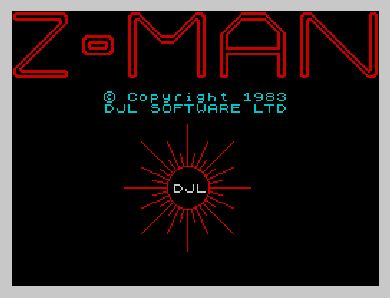
It's always nice to see people who've brazenly
pinched someone else's intellectual property
asserting their copyright over it...
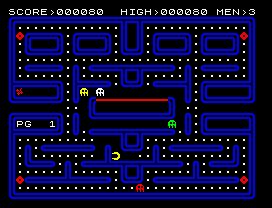
In the old days, cloners used to think that slightly
changing the layout of the Pac-Man maze would protect them from charges of
plagiarism.
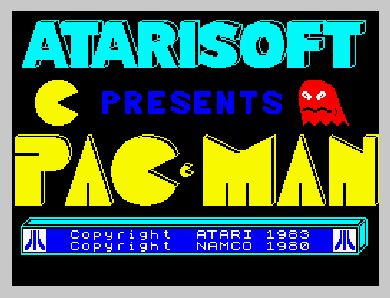
One swift new title screen and suddenly you're all
nice and legit.
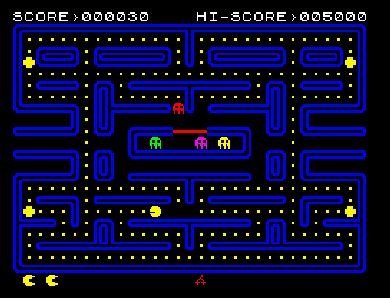
With the official seal of approval in place, the
Pac-maze could be safely restored to its proper shape and the power pills
made the right colour.
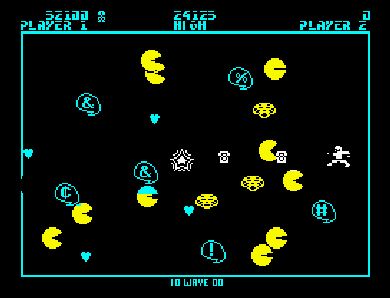
A typical stage from Dustman. You have to survive
until another dustman comes to rescue you. Or maybe you're rescuing him, I
forget.
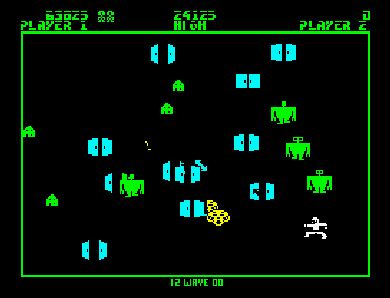
Another level ("Out Come The Heavies", to be
specific) of Dustman. Hmm, haven't we met
somewhere before, hulking big green dudes?
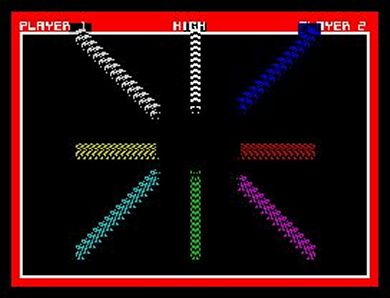
Tracing the development of Speccy Robotron part 1: here we
see the player's "rez-in" materialisation sequence from Wild West Hero.
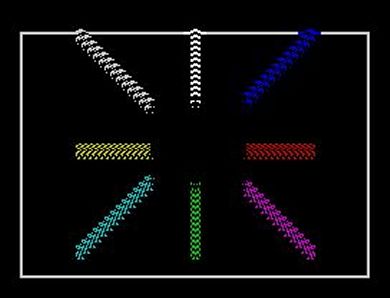
While this is the same sequence from the alpha
version of Speccy Robotron. Note that the player appears before the enemy
robots.
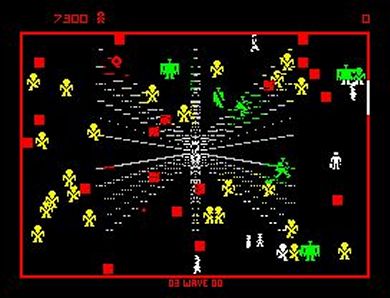
And this is the rez-in sequence from the finished
version of the game.

For comparison, here's the real arcade version.
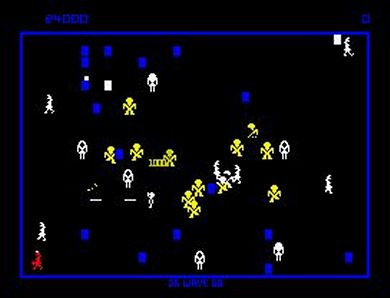
Wave 5 of the alpha version of Speccy Robotron. The
GRUNTs and humanoids are present, but the evil Brain Robotrons are
missing.
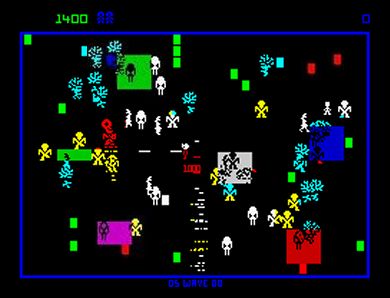
And here's Wave 5 from the final version, with Brains
present in a
(very) full cast list. Without piracy, you would never have seen this.
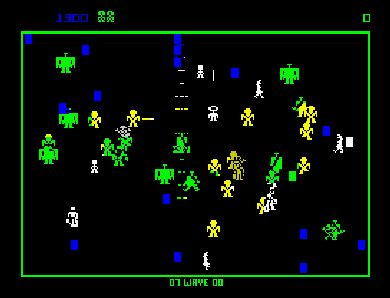
Sadly, the Tank Robotrons which should be making
their debut appearance in this wave didn't make it into even the final
version, and are the only enemies missing from
the Speccy version. If only Atarisoft had had the decency to hang on just
a little bit longer, eh?
|